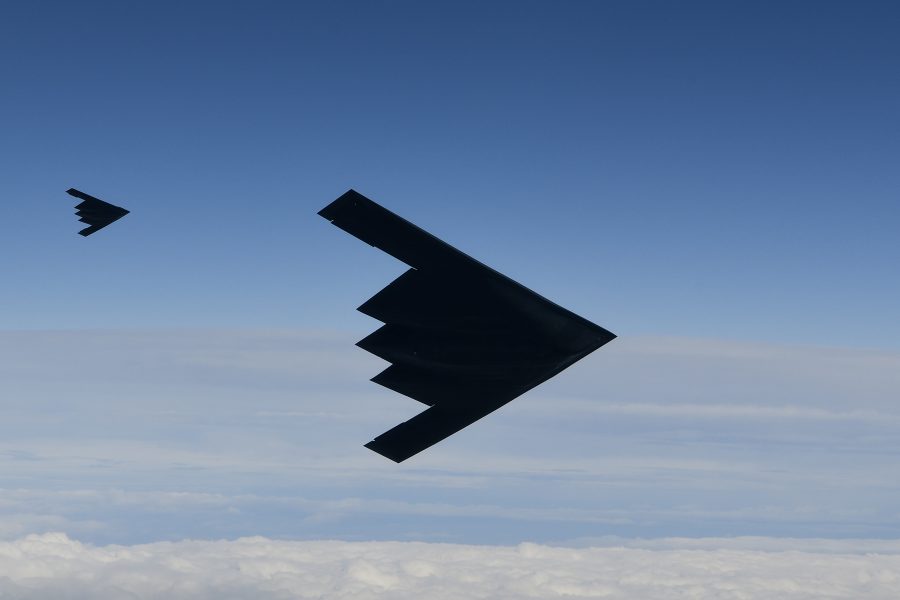BRUSSELS—U.S. Air Force B-2 Spirit stealth bombers struck Houthi targets in Yemen on Oct. 17, in a raid designed to degrade the group’s nearly yearlong campaign to disrupt global shipping in the Red Sea, Gulf of Aden, and the Bab El-Mandeb Strait, the U.S. military said.
It was the first time stealthy B-2s, worth upwards of a billion dollars an aircraft, have been employed against the Houthis, U.S. officials told Air & Space Forces Magazine. Other U.S. Air Force and U.S. Navy assets were also involved in the operation, U.S. Central Command said in a statement.
The B-2s—at least two, but officials did not say how many B-2s participated in the mission—struck five “hardened underground weapons storage locations,” said Secretary of Defense Lloyd J. Austin, who is here for meetings at NATO headquarters. The targets “contained various advanced conventional weapons,” CENTCOM said, including “missiles, weapons components, and other munitions used to target military and civilian vessels throughout the region.”
The heavy B-2s were able to strike with greater force than is possible with the fighter jets and drones used in prior attacks. The larger-payload weapons delivered by the B-2 are designed for destroying underground targets.
“This was a unique demonstration of the United States’ ability to target facilities that our adversaries seek to keep out of reach, no matter how deeply buried underground, hardened, or fortified,” Austin said. “The employment of U.S. Air Force B-2 Spirit long-range stealth bombers demonstrate U.S. global strike capabilities to take action against these targets when necessary, anytime, anywhere.”
The B-2s dropped 2,000-pound BLU-109 JDAM guided bombs, a person familiar with the matter told Air & Space Forces Magazine. Battle damage assessment is ongoing.
CENTCOM forces have conducted nearly daily operations against Houthi aerial and seaborne drones and ballistic and cruise missiles—both intercepting weapons and launching preemptive strikes before the group can launch their attacks. A rotating series of U.S. aircraft carriers and warships have been deployed off the coast of Yemen to protect vessels and conduct strikes against the Houthi forces that control most of Yemen. Still, the Houthis have managed to strike multiple commercial ships.
The Iranian-backed group has attacked vessels in the Red Sea region in what it says is retaliation for Israel’s military campaign against Hamas that began after Hamas attacked Israel on Oct. 7, 2023. The Houthis are part of a network of Iranian-backed groups in the region that includes Lebanese Hezbollah, Hamas, and Iranian-backed Iraqi militias, which have attacked U.S. forces in the region at least 180 times since last October.
“To deter the Houthi mindset is a challenge,” a senior U.S. defense official told Air & Space Forces Magazine before the latest airstrikes occurred. The Houthis benefit in some sense by attracting attention. Military confrontation, the official said, “gives them a voice.”
U.S. and British forces have previously sought to degrade the Houthis capabilities, and Israel also has conducted airstrikes in response to Houthi drone attacks on Israel.
“Our whole goal is to keep the lines of communication across the ocean free for international trade and keep the Houthi threat from targeting innocent mariners, disrupting trade and free flow of commerce,” the senior defense official said. “But as far as deterrence, I’m not sure it applies to Houthis like it classically would to maybe a different rational actor.”
Iran has less influence over the Houthis than other groups it supports, experts say. The Houthis produce many of their own weapons components themselves and are less reliant on components from Iran, which still supplies the group with high-end materiel, the official said.
“Our assessment right now is that the Houthis maybe do more indigenous production of things than we previously maybe gave them credit for,” the official said.
In recent months, CENTCOM commander Army Gen. Michael “Erik” Kurilla has pushed for a more robust, “whole of government” approach to containing the Houthis. On Oct. 17, the U.S. sanctioned multiple companies, vessels, and individuals for helping supply the Houthis with weapons, the State Department announced.
“We will continue to make clear to the Houthis that there will be consequences for their illegal and reckless attacks,” Austin said.


